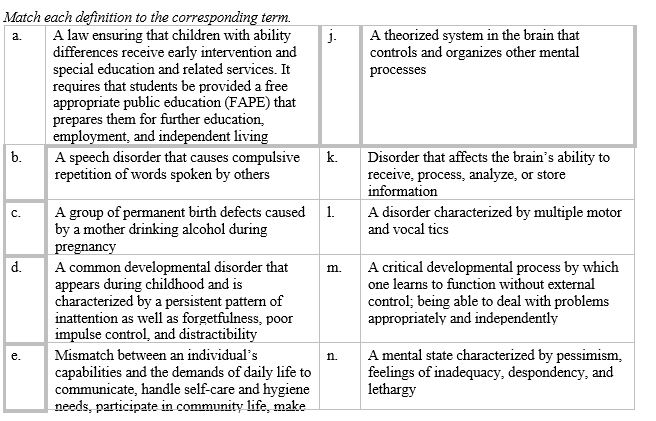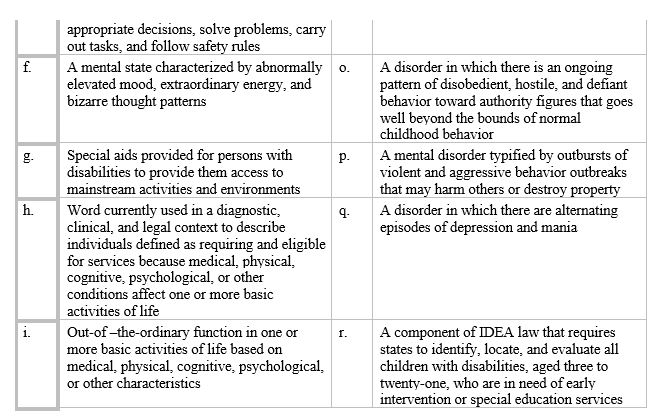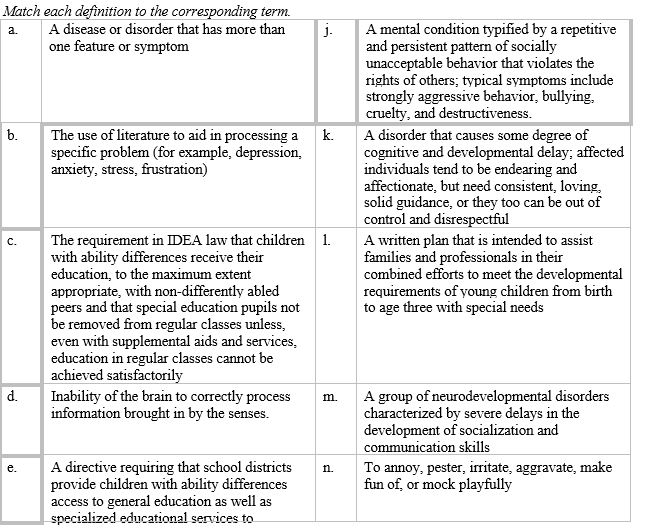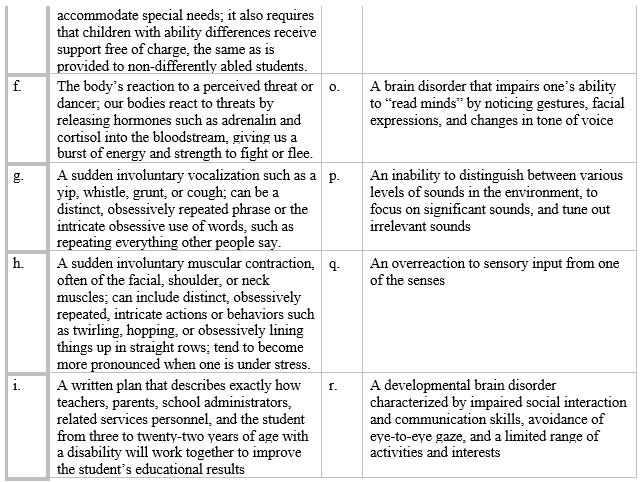Deck 6: Understanding Children With Ability Differences
Question
Question
Question
Question
Question
Question
Question
Question
Question
Question
Question
Question
Question
Question
Question
Question
Question
Question
Question
Question
Question
Question
Question
Question
Question
Question
Question
Question
Question
Question
Question
Question
Question
Question
Question
Question
Question
Question
Question
Question
Question
Question
Question
Question
Question
Question
Question
Question
Question
Question
Question
Question
Question
Question
Question
Question
Question
Question
Question
Question
Question
Question
Question
Question
Question
Question
Question
Question
Question
Question
Question
Question
Question
Question
Question
Question
Question
Question
Question
Question

Unlock Deck
Sign up to unlock the cards in this deck!
Unlock Deck
Unlock Deck
1/101
Play
Full screen (f)
Deck 6: Understanding Children With Ability Differences
1
The value of inclusive early childhood programs is not only to challenge children with abilitydifferences by allowing them to live in a "real-world" environment, but also to allow their peersto grow up knowing that children with ability differences are real people with real____________________ who have a lot to offer and who deserve to be treated well.
feelings
2
Studies have shown that attractive individuals have an advantage in employment settings and aremore likely to be acquitted for a(n) ____________________.
crime
3
We can help children lose their fear of people who are different by replacing it with____________________ and tolerance.
knowledge
4
DAP provides support for a(n) ____________________ lifestyle, good nutrition, sleep, andexercise.

Unlock Deck
Unlock for access to all 101 flashcards in this deck.
Unlock Deck
k this deck
5
We need to learn about how ability differences affect children and classrooms so we will noticeother children who may need to be referred for ____________________ by appropriateprofessionals.

Unlock Deck
Unlock for access to all 101 flashcards in this deck.
Unlock Deck
k this deck
6
Individualized interactions allow children with disabilities to ____________________ at theirown pace.

Unlock Deck
Unlock for access to all 101 flashcards in this deck.
Unlock Deck
k this deck
7
Children with ability differences sometimes behave ____________________ and needconsequences.

Unlock Deck
Unlock for access to all 101 flashcards in this deck.
Unlock Deck
k this deck
8
Books should depict individuals with ability differences as complete human beings with the sametypes of strengths and ____________________ as their peers.

Unlock Deck
Unlock for access to all 101 flashcards in this deck.
Unlock Deck
k this deck
9
Typically, when parents learn that their child has a serious ability difference they experiencemonths or years on a rollercoaster ride of overwhelming ____________________.

Unlock Deck
Unlock for access to all 101 flashcards in this deck.
Unlock Deck
k this deck
10
Adults often find that their ability to cope with a disabled child's behavior changes dramaticallyonce they understand that the child's problems are based on a physical, mental, or emotionalproblem and are not the child's ____________________.

Unlock Deck
Unlock for access to all 101 flashcards in this deck.
Unlock Deck
k this deck
11
The fight or ____________________ response is the body's reaction to a perceived threat.

Unlock Deck
Unlock for access to all 101 flashcards in this deck.
Unlock Deck
k this deck
12
Children ____________________ what they don't understand.

Unlock Deck
Unlock for access to all 101 flashcards in this deck.
Unlock Deck
k this deck
13
DAP provides skill development with age-appropriate, authentic, multisensory activities usingreal ____________________.

Unlock Deck
Unlock for access to all 101 flashcards in this deck.
Unlock Deck
k this deck
14
DAP requires careful ____________________ and record keeping.

Unlock Deck
Unlock for access to all 101 flashcards in this deck.
Unlock Deck
k this deck
15
Books should not depict people with ability differences as ____________________ observerswho take no active role in schools or in their communities.

Unlock Deck
Unlock for access to all 101 flashcards in this deck.
Unlock Deck
k this deck
16
Special education law-the Individuals with Disabilities Education Act, or IDEA-requires thatthe students be provided a(n) ____________________ that prepares them for further education,employment, and independent living.

Unlock Deck
Unlock for access to all 101 flashcards in this deck.
Unlock Deck
k this deck
17
Children with ____________________ need developmentally appropriate learning environmentsas much as or more than typically developing children.

Unlock Deck
Unlock for access to all 101 flashcards in this deck.
Unlock Deck
k this deck
18
Unattractive children are commonly ____________________ preferred as playmates by otherchildren.

Unlock Deck
Unlock for access to all 101 flashcards in this deck.
Unlock Deck
k this deck
19
Children are bombarded every day with messages from the television, radio, magazines, moviesand other public images indicating that it's not okay to be____________________.

Unlock Deck
Unlock for access to all 101 flashcards in this deck.
Unlock Deck
k this deck
20
Stay in close contact with the child's ____________________for suggestions on solving tactical"how-to" problems and for celebrating triumphs.

Unlock Deck
Unlock for access to all 101 flashcards in this deck.
Unlock Deck
k this deck
21
Match each definition to the corresponding term.


Intermittent explosive disorder


Intermittent explosive disorder

Unlock Deck
Unlock for access to all 101 flashcards in this deck.
Unlock Deck
k this deck
22
Match each definition to the corresponding term.


Executive system


Executive system

Unlock Deck
Unlock for access to all 101 flashcards in this deck.
Unlock Deck
k this deck
23
Match each definition to the corresponding term.


Fetal alcohol spectrum disorders


Fetal alcohol spectrum disorders

Unlock Deck
Unlock for access to all 101 flashcards in this deck.
Unlock Deck
k this deck
24
Match each definition to the corresponding term.


Attention deficit/hyperactivity disorder


Attention deficit/hyperactivity disorder

Unlock Deck
Unlock for access to all 101 flashcards in this deck.
Unlock Deck
k this deck
25
Match each definition to the corresponding term.


Child Find


Child Find

Unlock Deck
Unlock for access to all 101 flashcards in this deck.
Unlock Deck
k this deck
26
Match each definition to the corresponding term.


Accommodations


Accommodations

Unlock Deck
Unlock for access to all 101 flashcards in this deck.
Unlock Deck
k this deck
27
Match each definition to the corresponding term.


Mania


Mania

Unlock Deck
Unlock for access to all 101 flashcards in this deck.
Unlock Deck
k this deck
28
Match each definition to the corresponding term.


Tourette's disorder


Tourette's disorder

Unlock Deck
Unlock for access to all 101 flashcards in this deck.
Unlock Deck
k this deck
29
Match each definition to the corresponding term.


Echolalia


Echolalia

Unlock Deck
Unlock for access to all 101 flashcards in this deck.
Unlock Deck
k this deck
30
Match each definition to the corresponding term.


Self-regulation


Self-regulation

Unlock Deck
Unlock for access to all 101 flashcards in this deck.
Unlock Deck
k this deck
31
Match each definition to the corresponding term.


Learning disability


Learning disability

Unlock Deck
Unlock for access to all 101 flashcards in this deck.
Unlock Deck
k this deck
32
Match each definition to the corresponding term.


Intellectual disability


Intellectual disability

Unlock Deck
Unlock for access to all 101 flashcards in this deck.
Unlock Deck
k this deck
33
Match each definition to the corresponding term.


Depression


Depression

Unlock Deck
Unlock for access to all 101 flashcards in this deck.
Unlock Deck
k this deck
34
Match each definition to the corresponding term.


Individualized Family Service Plan (IFSP)


Individualized Family Service Plan (IFSP)

Unlock Deck
Unlock for access to all 101 flashcards in this deck.
Unlock Deck
k this deck
35
Match each definition to the corresponding term.


Least restrictive environment (LRE)


Least restrictive environment (LRE)

Unlock Deck
Unlock for access to all 101 flashcards in this deck.
Unlock Deck
k this deck
36
Match each definition to the corresponding term.


Individuals with Disabilities Education Act (IDEA)


Individuals with Disabilities Education Act (IDEA)

Unlock Deck
Unlock for access to all 101 flashcards in this deck.
Unlock Deck
k this deck
37
Match each definition to the corresponding term.


Ability difference


Ability difference

Unlock Deck
Unlock for access to all 101 flashcards in this deck.
Unlock Deck
k this deck
38
Match each definition to the corresponding term.


Bipolar disorder


Bipolar disorder

Unlock Deck
Unlock for access to all 101 flashcards in this deck.
Unlock Deck
k this deck
39
Match each definition to the corresponding term.


Oppositional defiant disorder


Oppositional defiant disorder

Unlock Deck
Unlock for access to all 101 flashcards in this deck.
Unlock Deck
k this deck
40
Match each definition to the corresponding term.


Disability


Disability

Unlock Deck
Unlock for access to all 101 flashcards in this deck.
Unlock Deck
k this deck
41
Match each definition to the corresponding term.


Auditory figure-ground dysfunction


Auditory figure-ground dysfunction

Unlock Deck
Unlock for access to all 101 flashcards in this deck.
Unlock Deck
k this deck
42
Match each definition to the corresponding term.


Fight or flight response


Fight or flight response

Unlock Deck
Unlock for access to all 101 flashcards in this deck.
Unlock Deck
k this deck
43
Match each definition to the corresponding term.


Free appropriate public education (FAPE)


Free appropriate public education (FAPE)

Unlock Deck
Unlock for access to all 101 flashcards in this deck.
Unlock Deck
k this deck
44
Match each definition to the corresponding term.


Bibliotherapy


Bibliotherapy

Unlock Deck
Unlock for access to all 101 flashcards in this deck.
Unlock Deck
k this deck
45
Match each definition to the corresponding term.


Mind blindness


Mind blindness

Unlock Deck
Unlock for access to all 101 flashcards in this deck.
Unlock Deck
k this deck
46
Match each definition to the corresponding term.


Syndrome


Syndrome

Unlock Deck
Unlock for access to all 101 flashcards in this deck.
Unlock Deck
k this deck
47
Match each definition to the corresponding term.


Hypersensitivity


Hypersensitivity

Unlock Deck
Unlock for access to all 101 flashcards in this deck.
Unlock Deck
k this deck
48
Match each definition to the corresponding term.


Individualized Education Program (IEP)


Individualized Education Program (IEP)

Unlock Deck
Unlock for access to all 101 flashcards in this deck.
Unlock Deck
k this deck
49
Match each definition to the corresponding term.


Motor tic


Motor tic

Unlock Deck
Unlock for access to all 101 flashcards in this deck.
Unlock Deck
k this deck
50
Match each definition to the corresponding term.


Down syndrome


Down syndrome

Unlock Deck
Unlock for access to all 101 flashcards in this deck.
Unlock Deck
k this deck
51
Children with disabilities especially need developmentally appropriate practice because DAPprovides
A)a calm, peaceful, and orderlyenvironment.
B)clear, simple statements of desiredoutcomes.
C)positive, assertive guidance.
D)all of these.
A)a calm, peaceful, and orderlyenvironment.
B)clear, simple statements of desiredoutcomes.
C)positive, assertive guidance.
D)all of these.

Unlock Deck
Unlock for access to all 101 flashcards in this deck.
Unlock Deck
k this deck
52
Some disabilities are hidden and can only be identified by a
A)college-trained early childhood professional.
B)professional medical expert.
C)center director.
D)all of these.
A)college-trained early childhood professional.
B)professional medical expert.
C)center director.
D)all of these.

Unlock Deck
Unlock for access to all 101 flashcards in this deck.
Unlock Deck
k this deck
53
Match each definition to the corresponding term.


Autism


Autism

Unlock Deck
Unlock for access to all 101 flashcards in this deck.
Unlock Deck
k this deck
54
Match each definition to the corresponding term.


Sensory processing disorder


Sensory processing disorder

Unlock Deck
Unlock for access to all 101 flashcards in this deck.
Unlock Deck
k this deck
55
Match each definition to the corresponding term.


Pervasive developmental disorders (PDDs)


Pervasive developmental disorders (PDDs)

Unlock Deck
Unlock for access to all 101 flashcards in this deck.
Unlock Deck
k this deck
56
Match each definition to the corresponding term.


Conduct disorder


Conduct disorder

Unlock Deck
Unlock for access to all 101 flashcards in this deck.
Unlock Deck
k this deck
57
To guide children with ability differences and their peers effectively, we need to
A)tell parents exactly what disability accommodations their child will and won't need.
B)write up a plan of action (IEP) for the child without any help from the parents.
C)treat them the same as typically developing children.
D)learn how ability differences affect children and classrooms.
E)all of these.
A)tell parents exactly what disability accommodations their child will and won't need.
B)write up a plan of action (IEP) for the child without any help from the parents.
C)treat them the same as typically developing children.
D)learn how ability differences affect children and classrooms.
E)all of these.

Unlock Deck
Unlock for access to all 101 flashcards in this deck.
Unlock Deck
k this deck
58
Match each definition to the corresponding term.


Vocal tic


Vocal tic

Unlock Deck
Unlock for access to all 101 flashcards in this deck.
Unlock Deck
k this deck
59
Match each definition to the corresponding term.


Teasing


Teasing

Unlock Deck
Unlock for access to all 101 flashcards in this deck.
Unlock Deck
k this deck
60
Some disabilities are so obvious that
A)teachers recognize that something is different.
B)parents recognize that something is different.
C)babies and toddlers recognize that something is different.
D)other children recognize that something is different.
E)all of these s.
A)teachers recognize that something is different.
B)parents recognize that something is different.
C)babies and toddlers recognize that something is different.
D)other children recognize that something is different.
E)all of these s.

Unlock Deck
Unlock for access to all 101 flashcards in this deck.
Unlock Deck
k this deck
61
Children with deformities such as cleft lip and facial burns are usually victims of teasing andharassment.

Unlock Deck
Unlock for access to all 101 flashcards in this deck.
Unlock Deck
k this deck
62
Every day children are bombarded with messages from television, radio, magazines, movies, andother public images indicating that
A)the heroes are all gorgeous and the villains are ugly, with irregular features and rough,scarred complexions.
B)it's not okay to be different.
C)to fit in and be popular, you have to have perfectly white teeth, fresh breath, glossy hair,and no "embarrassing" irregularities.
D)all of these.
E)none of these.
A)the heroes are all gorgeous and the villains are ugly, with irregular features and rough,scarred complexions.
B)it's not okay to be different.
C)to fit in and be popular, you have to have perfectly white teeth, fresh breath, glossy hair,and no "embarrassing" irregularities.
D)all of these.
E)none of these.

Unlock Deck
Unlock for access to all 101 flashcards in this deck.
Unlock Deck
k this deck
63
Research suggests that unattractive children are generally
A)treated more harshly by adults who do not know them.
B)viewed as less developmentally competent.
C)not preferred as playmates by other children.
D)all of these.
A)treated more harshly by adults who do not know them.
B)viewed as less developmentally competent.
C)not preferred as playmates by other children.
D)all of these.

Unlock Deck
Unlock for access to all 101 flashcards in this deck.
Unlock Deck
k this deck
64
We can help children lose their fear of people who are different by
A)firmly insisting that there is nothing to be afraid of.
B)punishing them for bullying others with disabilities.
C)rewarding them with candy any time they are nice to a child who seems different.
D)replacing their fear with knowledge and tolerance.
A)firmly insisting that there is nothing to be afraid of.
B)punishing them for bullying others with disabilities.
C)rewarding them with candy any time they are nice to a child who seems different.
D)replacing their fear with knowledge and tolerance.

Unlock Deck
Unlock for access to all 101 flashcards in this deck.
Unlock Deck
k this deck
65
When you realize that bullying has occurred
A)intervene immediately.
B)teach the child who has been bullied to be assertive and make eye contact.
C)empower the child who has been bullied by helping him or her think of ways to solve theproblem.
D)all of these.
A)intervene immediately.
B)teach the child who has been bullied to be assertive and make eye contact.
C)empower the child who has been bullied by helping him or her think of ways to solve theproblem.
D)all of these.

Unlock Deck
Unlock for access to all 101 flashcards in this deck.
Unlock Deck
k this deck
66
Our role as early childhood professionals is to
A)provide and explain objective observations of the child's classroom behavior.
B)caringly support the family.
C)give objective information about relevant sources.
D)all of these.
E)none of these.
A)provide and explain objective observations of the child's classroom behavior.
B)caringly support the family.
C)give objective information about relevant sources.
D)all of these.
E)none of these.

Unlock Deck
Unlock for access to all 101 flashcards in this deck.
Unlock Deck
k this deck
67
Avoid children's books that
A)depict ordinary actions and achievements as heroic when performed by a person with anability difference.
B)depict people with disabilities as helpless or always dependent on others to function inthe world.
C)use unacceptable disability-related language.
D)fail to show people with disabilities participating in activities accurate for their agegroup.
E)all of these.
A)depict ordinary actions and achievements as heroic when performed by a person with anability difference.
B)depict people with disabilities as helpless or always dependent on others to function inthe world.
C)use unacceptable disability-related language.
D)fail to show people with disabilities participating in activities accurate for their agegroup.
E)all of these.

Unlock Deck
Unlock for access to all 101 flashcards in this deck.
Unlock Deck
k this deck
68
Children with disabilities don't need developmentally appropriate practice.

Unlock Deck
Unlock for access to all 101 flashcards in this deck.
Unlock Deck
k this deck
69
Books should
A)promote respect and empathy for individuals with ability differences.
B)use a child's first language.
C)promote understanding and acceptance.
D)provide accurate information about ability differences.
E)all of these.
A)promote respect and empathy for individuals with ability differences.
B)use a child's first language.
C)promote understanding and acceptance.
D)provide accurate information about ability differences.
E)all of these.

Unlock Deck
Unlock for access to all 101 flashcards in this deck.
Unlock Deck
k this deck
70
Bullying can cause a targeted child to
A)become active and outgoing.
B)describe him- or herself in positive terms.
C)experience learning problems.
D)none of these.
A)become active and outgoing.
B)describe him- or herself in positive terms.
C)experience learning problems.
D)none of these.

Unlock Deck
Unlock for access to all 101 flashcards in this deck.
Unlock Deck
k this deck
71
Inclusive early childhood programs challenge children with disabilities by allowing them to livein "real-world" environments.

Unlock Deck
Unlock for access to all 101 flashcards in this deck.
Unlock Deck
k this deck
72
Children with ability differences often need special accommodations to help them interact, learn,and play as naturally as possible with their typically developing peers.

Unlock Deck
Unlock for access to all 101 flashcards in this deck.
Unlock Deck
k this deck
73
Unattractive children are commonly preferred as playmates by other children.

Unlock Deck
Unlock for access to all 101 flashcards in this deck.
Unlock Deck
k this deck
74
From infancy, our brains are constantly sensing, perceiving, and storing information from
A)the outside world.
B)computers.
C)encyclopedias.
D)all of these.
E)none of these.
A)the outside world.
B)computers.
C)encyclopedias.
D)all of these.
E)none of these.

Unlock Deck
Unlock for access to all 101 flashcards in this deck.
Unlock Deck
k this deck
75
The more often very young children see people in wheelchairs at a very early age, the more likelythey are to include this image in their mental category of "weird" things

Unlock Deck
Unlock for access to all 101 flashcards in this deck.
Unlock Deck
k this deck
76
In TV and movies, "heroes" are usually attractive and "villains" are usually unattractive.

Unlock Deck
Unlock for access to all 101 flashcards in this deck.
Unlock Deck
k this deck
77
Our bodies react to threats by releasing hormones such as flavenoids into the bloodstream, givingus a burst of energy and strength to fight or flee.

Unlock Deck
Unlock for access to all 101 flashcards in this deck.
Unlock Deck
k this deck
78
The ax murderers in terror movies in our society often have a face that looks like a
A)handsome, Hollywood leading-man type.
B)person who has been terribly scarred by a fire.
C)model's face you would see in a magazine..
D)all of these.
E)none of these.
A)handsome, Hollywood leading-man type.
B)person who has been terribly scarred by a fire.
C)model's face you would see in a magazine..
D)all of these.
E)none of these.

Unlock Deck
Unlock for access to all 101 flashcards in this deck.
Unlock Deck
k this deck
79
Typical behaviors of ADHD include
A)extraordinary difficulty concentrating or paying attention most of the time.
B)uncomfortable speaking up.
C)good self-control.
D)none of these.
A)extraordinary difficulty concentrating or paying attention most of the time.
B)uncomfortable speaking up.
C)good self-control.
D)none of these.

Unlock Deck
Unlock for access to all 101 flashcards in this deck.
Unlock Deck
k this deck
80
Infants, toddlers, and young children consider faces with very average, symmetrical features andnothing that looks out of the ordinary the most attractive.

Unlock Deck
Unlock for access to all 101 flashcards in this deck.
Unlock Deck
k this deck


